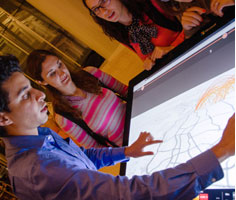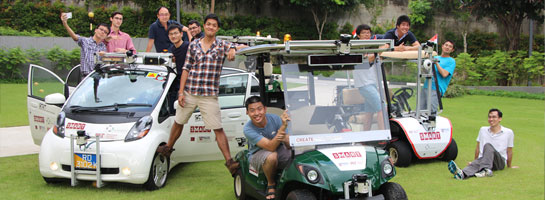




 SMART M3S Lead Principal Investigator and MIT Professor, Professor Jinhua Zhao (Credit: SMART M3S)
SMART M3S Lead Principal Investigator and MIT Professor, Professor Jinhua Zhao (Credit: SMART M3S)
Singapore MIT-Alliance for Research and Technology (SMART), MIT’s research enterprise in Singapore, has launched a new interdisciplinary research group (IRG) aimed at tackling key social and institutional challenges around the rise of AI and new technologies, furthering advances in these fields to create impactful value for Singapore and the world beyond. In line with Singapore’s Smart Nation initiative and the National AI Strategy, and as part of SMART's commitment to foster collaborative research in Singapore that generates positive impact for society, Mens, Manus and Machina - How AI Empowers People, Institutions and the City in Singapore (M3S) will embark on an ambitious five year endeavour supported by a multi-million-dollar grant from the National Research Foundation (NRF) under its Campus for Research Excellence And Technological Enterprise (CREATE) programme.
Bringing together a diverse team of 17 professors from the Massachusetts Institute of Technology (MIT) and Singapore, SMART M3S will also draw expertise from local researchers from Singapore Management University (SMU), Singapore University of Technology and Design (SUTD), the National University of Singapore (NUS), and the National Robotics Programme (NRP).
As Asia’s smartest city, Singapore’s integration of AI, automation, and robotics has been facilitated by strategic use of data analytics, IoT technologies, and smart infrastructure. Amid the rise of AI and machine learning, SMART M3S will contribute to Singapore's AI ecosystem by focusing on the human-machine relationship, enhancing existing AI initiatives in the city-state.
Mens, Manus and Machina (M3S) - inspired by MIT’s motto of mens et manus (mind and hand) - reflects the research group’s ideals to promote AI and machine use for practical application; technologies that are extensions of humans and augment their lives. SMART M3S, in a world first, integrates research into robotics and A.I. with human capital development, economic growth, and public acceptability - an intersectional approach to the ongoing transformation of how we work and live.
This interdisciplinary approach encompasses tackling key issues such as physical and digital interfaces between humans and machines, machine learning fundamentals, and understanding the implications of AI for human and social capital development. Other issues of focus include work on structuring human-machine teams within organisations and the developing dynamics between humans and machines in resource allocation and manpower (as well as machine-power) management.
The research conducted will significantly advance the fields of soft robotics, brain interfaces, learning algorithms, task allocation, team formation, model compression, sustainable technology, technology acceptability in the workplace, social acceptability of robotics and AI, and more. The impact of AI on human welfare and productivity and how AI technology can advance both areas will be central considerations for the work at SMART M3S, as society navigates the transition towards an AI- and machine-enhanced future.
Through interdisciplinary research, knowledge sharing, and impactful collaborations, SMART M3S aims to redefine the boundaries of AI, automation, and robotics to scientific, societal and commercial impact. The work at M3S will explore the intricate interplay between human capabilities, emerging technologies, and societal structures, paving the way for designing inclusive, resilient, and innovative solutions that empower individuals, institutions, and cities in Singapore. SMART M3S, by collaborating with Singaporean partners, will enhance Singapore’s ability to create forward-looking AI policies, invigorate Singapore’s economic standing within AI, and support local workforce training and mentorship on AI topics.
Since its inception in Singapore in 2007, SMART has pioneered innovations that have transformed and are transforming a multitude of fields such as autonomous driving, agriculture, microelectronics, cell therapy, mechanics and microfluidics platforms for biology and medical diagnostics, and antimicrobial resistance.
“As a species, humans have spent eons learning how to work effectively with each other but, at the scale of human history, we are still neophytes to computation and automation,” said Professor Jinhua Zhao, Professor at MIT and Lead Principal Investigator at SMART M3S. “We focus on two questions at M3S: How will we design AI and Robotics technologies and train humans to build the skills and habits necessary for success in a robotics-heavy work environment? How will we adapt our social and business institutions to create the incentives and protections necessary to drive innovation and social welfare?”
SMART M3S is helmed by Lead Principal Investigator (PI) Professor Zhao and Co-lead PIs MIT Professor Daniela Rus and SMU Professor Archan Misra.
Professor Rus shared, “The M3S collaboration between MIT and Singapore, through SMART, will break new ground in our understanding of AI's impact on the future of work. By harnessing our collective expertise and innovative spirit, we aim to advance the state of the art in AI and turn this technological advancement into an engine for human potential and societal progress.”
Professor Misra noted, “M3S is distinguished by its ambition to address the key challenges of human-AI synergy holistically, from both a scientific and societal perspective. It will focus not just on the technical breakthroughs that will allow human workers and AI-enabled machines and software to work interactively, but also on the training and governance mechanisms that ensure that individuals and organisations adapt to and thrive in this new future of work. I’m especially excited to partner MIT on this important national priority, which aligns perfectly with SMU’s strategic multi-disciplinary research priority area of Digital Transformation”.
Eugene A. Fitzgerald, CEO and Director of SMART, added, “Since 2007, SMART has pioneered impactful innovations across various fields, transforming industries such as autonomous driving, agriculture, cell therapy, microelectronics, and medical diagnostics by bringing together some of the finest from MIT and Singapore. With our latest interdisciplinary research group SMART M3S, we further our commitment to bringing scientific, social, and commercial impact to Singapore and beyond. The focus on a human-centric approach to AI advancement will contribute towards Singapore being at the forefront of the future of work.”
Seeking to redefine the boundaries of AI, automation, and robotics through interdisciplinary research, knowledge sharing, and impactful collaborations, SMART M3S aims to design inclusive, resilient, and innovative solutions that empower individuals, institutions, and cities. By exploring the intricate relationship between human capabilities, emerging technologies, and societal structures, it is envisioned that SMART M3S will drive scientific, societal, and commercial impact in Singapore and beyond.